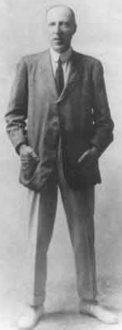|
On Wayfaring Further Afield

Cecil James Sharp (1859–1924) was the founding father of the folklore revival in England in the
early twentieth century, and many of England's traditional dances and music owe their continuing existence to his work in
recording and publishing them. Cecil Sharp was a music teacher and composer interested in folk songs and music, who became
interested in traditional English dance when he saw a group of Morris dancers at the village of Headington Quarry, just outside Oxford, in 1899. At this time, Morris dancing was almost extinct, and the interest generated by Sharp's notations kept the tradition
alive. The revival of the Morris dances started when Mary Neal, the organiser of the Esperance Girls' Club in London, used
Sharp's (then unpublished) notations to teach the traditional dances to the club's members in 1905. Their enthusiasm for the
dances persuaded Sharp to publish his notations in the form of his Morris Books, starting in 1907.
Between 1911 and 1913 he published a three-volume work, The Sword Dances of Northern England, which described the
obscure and near-extinct Rapper sword dance of Northumbria and Long Sword dance of Yorkshire. This led to the revival of both traditions in their home areas, and later elsewhere.
Sharp often published versions of the songs he collected, which included a part for piano that Sharp composed himself.
It appears that the traditional singers (who always sang a cappella) found Sharp's piano parts to be just distracting
noise. However, the piano versions did help Sharp in his goal of teaching English folk music to children in schools, thus
"reacquainting" them, as he felt, with their national musical heritage.
The schools project perhaps also accounts for Sharp's practice of heavily bowdlerizing the lyrics, which, at least among
the English songs, often emphasize sex and violence. Thus, there are often great differences between the songs as recorded
in Sharp's field notes and what he published. An extreme case is the song The Keeper, whose original lyrics evidently
celebrate rape. Sharp's revised lyrics turn it into a comic hunting song.
Sharp also helped instigate a period of nationalism in English classical music, the idea being to reinvigorate English
composition by grounding it in its national folk music. Among the composers who took up this goal was Ralph Vaughan Williams, who carried out his own field work on folk song.
In 1911 Sharp founded the English Folk Dance Society which promoted the traditional dances through workshops held nationwide, and which later merged with the Folk Song Society
in 1932 to form the English Folk Dance and Song Society (EFDSS). The current London headquarters of the EFDSS is named Cecil Sharp House in his honour.
|
 |
|
 |
 |
|
![The Morris Book. Cecil Sharp [click for larger]](sitebuildercontent/sitebuilderpictures/.pond/cover-themorrisbook-cecilsharp-2ndedition1.jpg.w180h246.jpg)
|
|
The Morris Book by
Cecil J. Sharp and
Herbert C. Macilwaine
(Part 1) 2nd Edition, published
by Novello and Company, London, 1912
The revival of the Morris dances started
Esperance Girls' Club in London, used
Sharp's (then unpublished) notations to
teach the traditional dances to the
club's members in 1905. Their
enthusiasm for the dances persuaded
Sharp to publish his notations in the
form of his Morris Books, starting in 1907.
|
|
 |
 |
Cecil Sharp's momentous first meeting
with William Kimber and the
Headington Morris
to let you know about the Society, what
it does, and what it can do for you. If you
are interested in traditional
folk dance, song or traditions, then this
is the place to learn more
headquartered at Cecil Sharp House
first folk song, The Seeds of Love, from
in
Somerset.
still dancing after all these years
|
 |
|
|
 |
|
|
|

